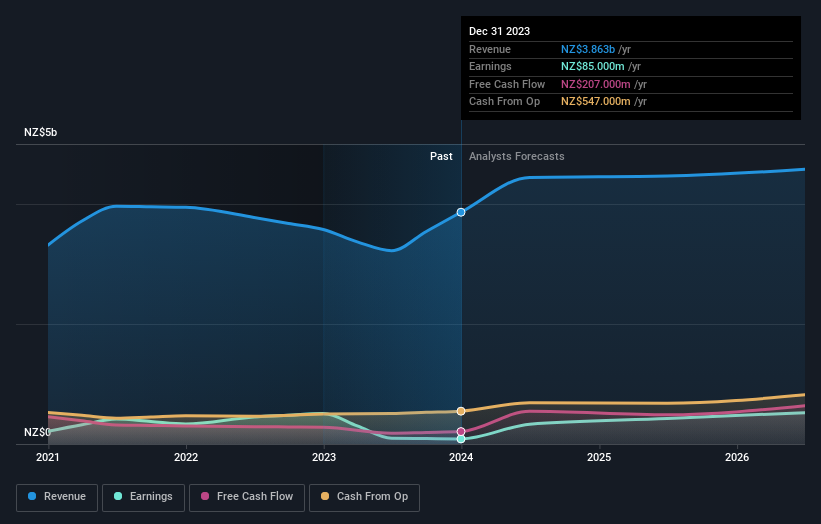Meridian Energy Limited's (NZSE:MEL) top owners are state or government with 51% stake, while 36% is held by individual investors
Key Insights
Significant control over Meridian Energy by state or government implies that the general public has more power to influence management and governance-related decisions
The largest shareholder of the company is New Zealand with a 51% stake
Every investor in Meridian Energy Limited (NZSE:MEL) should be aware of the most powerful shareholder groups. With 51% stake, state or government possess the maximum shares in the company. Put another way, the group faces the maximum upside potential (or downside risk).
And individual investors on the other hand have a 36% ownership in the company.
Let's delve deeper into each type of owner of Meridian Energy, beginning with the chart below.
See our latest analysis for Meridian Energy
What Does The Institutional Ownership Tell Us About Meridian Energy?
Many institutions measure their performance against an index that approximates the local market. So they usually pay more attention to companies that are included in major indices.
We can see that Meridian Energy does have institutional investors; and they hold a good portion of the company's stock. This implies the analysts working for those institutions have looked at the stock and they like it. But just like anyone else, they could be wrong. It is not uncommon to see a big share price drop if two large institutional investors try to sell out of a stock at the same time. So it is worth checking the past earnings trajectory of Meridian Energy, (below). Of course, keep in mind that there are other factors to consider, too.
Hedge funds don't have many shares in Meridian Energy. New Zealand is currently the company's largest shareholder with 51% of shares outstanding. This implies that they have majority interest control of the future of the company. In comparison, the second and third largest shareholders hold about 1.9% and 1.8% of the stock.
While it makes sense to study institutional ownership data for a company, it also makes sense to study analyst sentiments to know which way the wind is blowing. There are plenty of analysts covering the stock, so it might be worth seeing what they are forecasting, too.
Insider Ownership Of Meridian Energy
The definition of company insiders can be subjective and does vary between jurisdictions. Our data reflects individual insiders, capturing board members at the very least. Management ultimately answers to the board. However, it is not uncommon for managers to be executive board members, especially if they are a founder or the CEO.
I generally consider insider ownership to be a good thing. However, on some occasions it makes it more difficult for other shareholders to hold the board accountable for decisions.
Our data suggests that insiders own under 1% of Meridian Energy Limited in their own names. Being so large, we would not expect insiders to own a large proportion of the stock. Collectively, they own NZ$9.9m of stock. It is always good to see at least some insider ownership, but it might be worth checking if those insiders have been selling.
General Public Ownership
The general public, who are usually individual investors, hold a 36% stake in Meridian Energy. While this group can't necessarily call the shots, it can certainly have a real influence on how the company is run.
Next Steps:
While it is well worth considering the different groups that own a company, there are other factors that are even more important. To that end, you should learn about the 2 warning signs we've spotted with Meridian Energy (including 1 which is a bit concerning) .
Ultimately the future is most important. You can access this free report on analyst forecasts for the company.
NB: Figures in this article are calculated using data from the last twelve months, which refer to the 12-month period ending on the last date of the month the financial statement is dated. This may not be consistent with full year annual report figures.
Have feedback on this article? Concerned about the content? Get in touch with us directly. Alternatively, email editorial-team (at) simplywallst.com.
This article by Simply Wall St is general in nature. We provide commentary based on historical data and analyst forecasts only using an unbiased methodology and our articles are not intended to be financial advice. It does not constitute a recommendation to buy or sell any stock, and does not take account of your objectives, or your financial situation. We aim to bring you long-term focused analysis driven by fundamental data. Note that our analysis may not factor in the latest price-sensitive company announcements or qualitative material. Simply Wall St has no position in any stocks mentioned.

 Yahoo Finance
Yahoo Finance 

